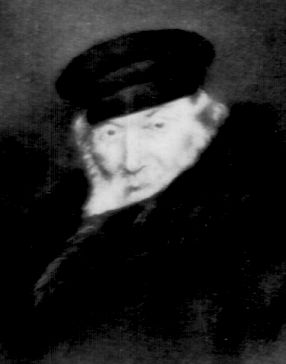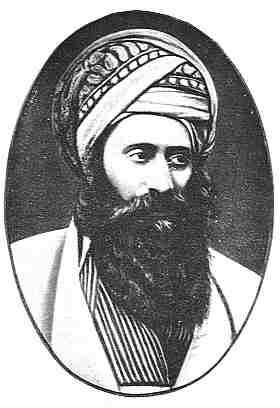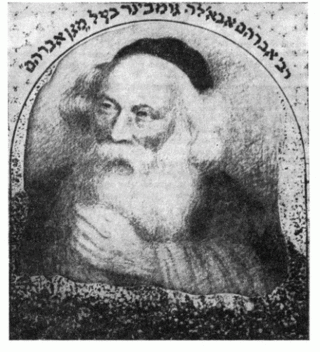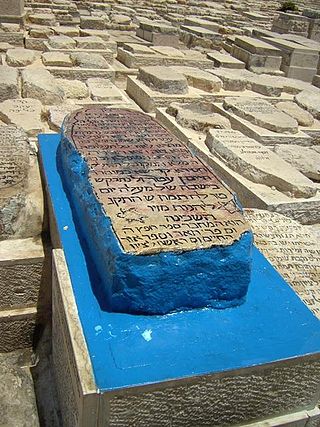Related Research Articles

Yisrael Meir ha-Kohen Kagan, known popularly as the Chofetz Chaim, after his book on lashon hara, who was also well known for the Mishna Berurah, his book on ritual law, was an influential Lithuanian Jewish rabbi, Halakhist, posek, and ethicist whose works continue to be widely influential in Orthodox Jewish life.

Hayim Nahman Bialik was a Jewish poet who wrote primarily in Hebrew and Yiddish. Bialik is considered a pioneer of modern Hebrew poetry, part of the vanguard of Jewish thinkers who gave voice to a new spirit of his time, and recognized today as Israel's national poet. Being a noted essayist and story-teller, Bialik also translated major works from European languages.

Haim Yosef David Azulai ben Yitzhak Zerachia, commonly known as the Hida, was a Jerusalem born rabbinical scholar, a noted bibliophile, and a pioneer in the publication of Jewish religious writings.

Yosef Hayim was a leading Baghdadi hakham, authority on halakha, and Master Kabbalist. He is best known as author of the work on halakhaBen Ish Ḥai, a collection of the laws of everyday life interspersed with mystical insights and customs, addressed to the masses and arranged by the weekly Torah portion.

Abraham Abele Gombiner, known as the Magen Avraham, born in Gąbin (Gombin), Poland, was a rabbi, Talmudist and a leading religious authority in the Jewish community of Kalisz, Poland during the seventeenth century. His full name is Avraham Abele ben Chaim HaLevi from the town of Gombin. There are texts that list his family name as Kalisz after the city of his residence. After his parents were killed in 1655 during the aftermath of the Chmielnicki massacres of 1648, he moved to live and study with his relative in Leszno, Jacob Isaac Gombiner. From there he moved to Kalisz where he was appointed as Rosh Yeshiva and judge in the tribunal of Rabbi Israel Spira.

Chai or Hai is a symbol that figures prominently in modern Jewish culture; the Hebrew letters of the word are often used as a visual symbol.

Chaim ibn Attar or Ḥayyim ben Moshe ibn Attar also known as the Or ha-Ḥayyim after his popular commentary on the Torah, was a Talmudist and Kabbalist. He is arguably considered to be one of the most prominent Rabbis of Morocco, and is highly regarded in Hassidic Judaism.
Abulafia or Abolafia is a Sephardi Jewish surname whose etymological origin is in the Arabic language. The family name, like many other Hispanic-origin Sephardic Jewish surnames, originated in Spain among Spanish Jews (Sephardim), during the time when it was ruled as Al-Andalus by Arabic-speaking Moors.
Etz Hayim, also transliterated as Eitz Chaim, is a common term used in Judaism. The expression can be found in Genesis 2:9, referring to the Tree of Life in the Garden of Eden. It is also found in the Book of Proverbs, where it is figuratively applied to "the Torah" Proverbs 3:18, "the fruit of a righteous man" Proverbs 11:30, "a desire fulfilled" Proverbs 13:12, and "healing tongue" Proverbs 15:4.

Haim Palachi was a Jewish-Turkish chief rabbi of Smyrna (İzmir) and author in Ladino and Hebrew. His titles included Hakham Bashi and Gaon. He was the father of grand rabbis Abraham Palacci and Isaac Palacci and rabbi Joseph Palacci. He was a member of the Pallache family.
The primary texts of Kabbalah were allegedly once part of an ongoing oral tradition. The written texts are obscure and difficult for readers who are unfamiliar with Jewish spirituality which assumes extensive knowledge of the Tanakh, Midrash and halakha.
Reuvein Margolies, was an Israeli author, Talmudic scholar and head of the Rambam library.
Ben Haim, also transliterated as Ben Hayim or Ben-Chaim, is a Hebrew surname meaning "son of life". Notable people with the surname include:

Ḥayyim Selig ben Ya'akov Slonimski, also known by his acronym ḤaZaS, was a Hebrew publisher, mathematician, astronomer, inventor, science writer, and rabbi. He was among the first to write books on science for a broad Jewish audience, and was the founder of Ha-Tsfira, the first Hebrew-language newspaper with an emphasis on the sciences.
Haim is a Hebrew name.
The following outline is provided as an overview of and topical guide to Judaism:
Relative hour, sometimes called halachic hour, seasonal hour and variable hour, is a term used in rabbinic Jewish law that assigns 12 hours to each day and 12 hours to each night, all throughout the year. A relative hour has no fixed length in absolute time, but changes with the length of daylight each day - depending on summer, and in winter. Even so, in all seasons a day is always divided into 12 hours, and a night is always divided into 12 hours, which invariably makes for a longer hour or a shorter hour. At Mediterranean latitude, one hour can be about 45 minutes at the winter solstice, and 75 minutes at summer solstice. All of the hours mentioned by the Sages in either the Mishnah or Talmud, or in other rabbinic writings, refer strictly to relative hours.
The Oxford University L'Chaim Society was a student society at the University of Oxford from 1989 to 2001. At its peak, it was the second-largest society within the University of Oxford.
Chaim Tchernowitz (1871-1949), also known by his pen name Rav Tzair, was a Russian-American rabbi, author, teacher, and publicist.
References
- ↑ Mike Campbell. "Meaning, Origin and History of the Name Chayyim". Behind the Name. Retrieved 2013-08-12.
- ↑ Mike Campbell. "Meaning, Origin and History of the Name Chaya". Behind the Name. Retrieved 2013-08-12.
- ↑ Donin, Hayim H. (1980). To Pray as a Jew: A Guide to the Prayer Book and the Synagogue Service. Basic Books. p. 310. ISBN 978-1-5416-7403-5.
- ↑ S.Z. Ariel (1960), Enẓiklopedyah Me'ir Nativ le-Halakhot, Minhagim, Darkhei Musar u-Ma'asim Tovim, s.v. "לחיים"
- 1 2 The Oxford Dictionary of Family Names in Britain and Ireland, ed. by Patrick Hanks, Richard Coates, and Peter McClure, 4 vols (Oxford: Oxford University Press, 2016), II, pp. 1168–67 [s.vv. Haim, Haime]; ISBN 978-0-19-967776-4.